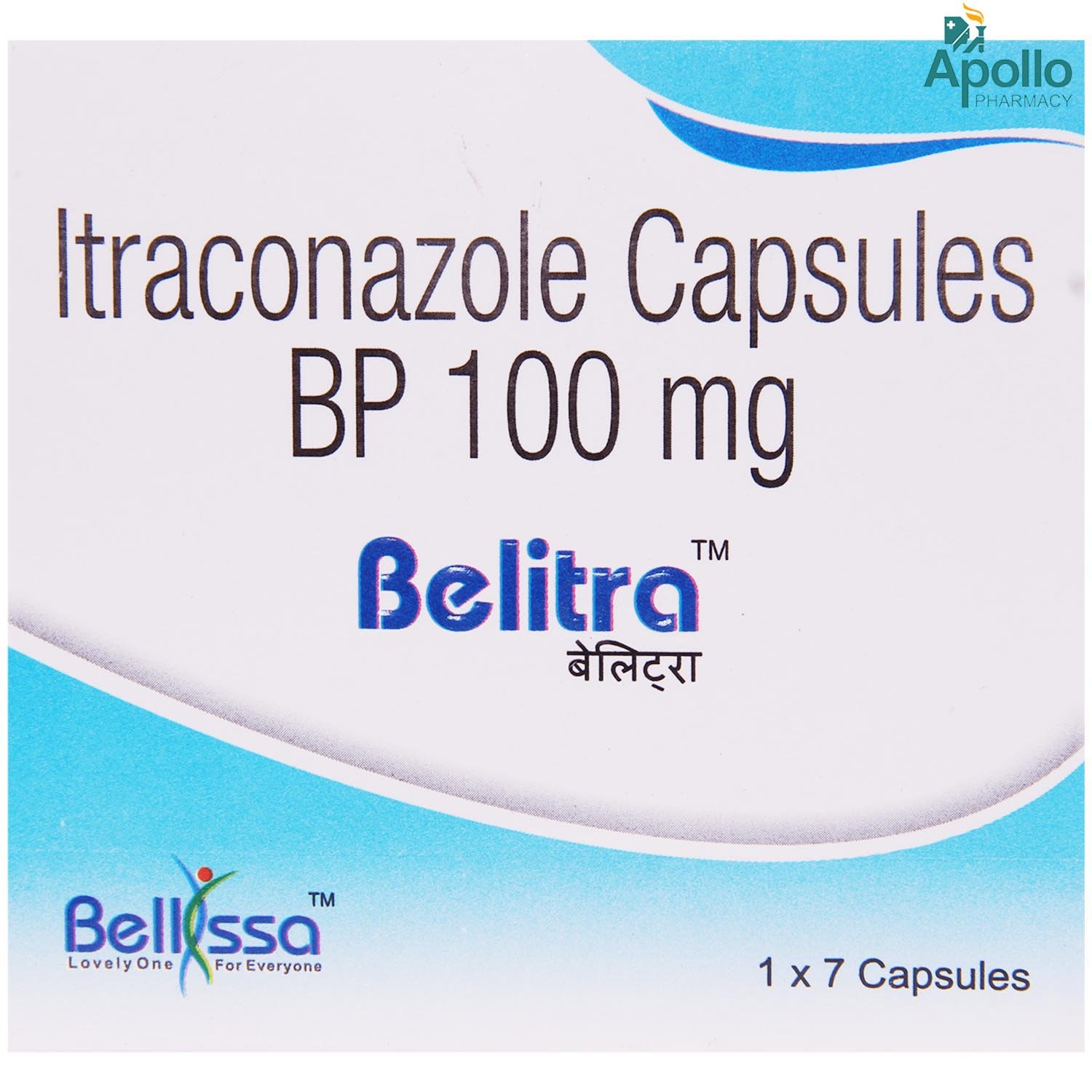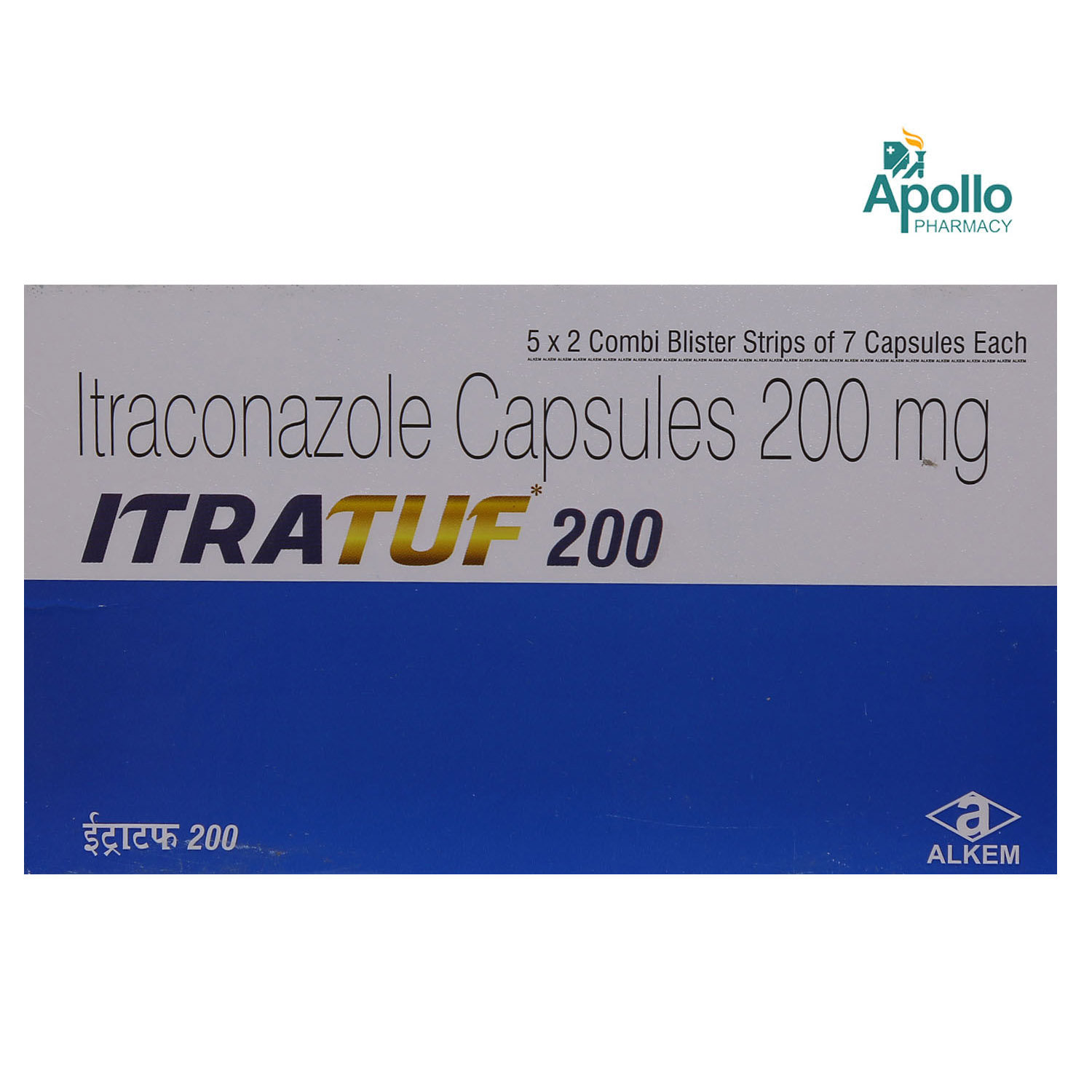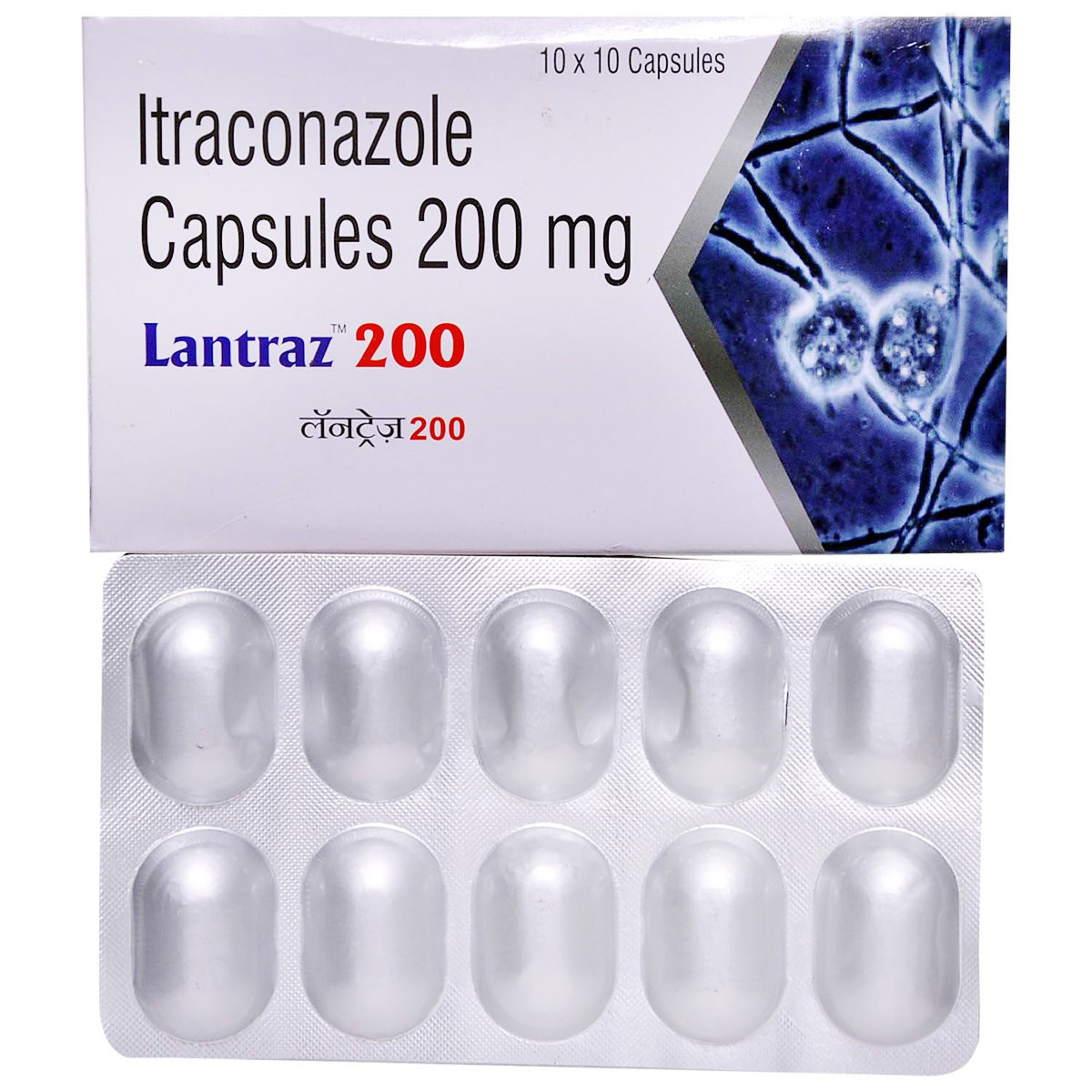Itraconazole
About Itraconazole
Itraconazole belongs to a class of drugs called antifungals used to treat fungal infections of the mouth, throat, toenails, fingernails or lungs. Fungal infection is a disease in which a fungus attacks the tissue and causes infection. Fungal infections may be contagious (spread from one person to another).
Itraconazole contains Itraconazole, an antifungal that works by inhibiting the production of ergosterol (a main component of cell membranes of fungi). Thereby, weakens and damages the fungal cell membranes that are essential for their survival as they prevent the entry of unwanted substances into the cells and stop the leakage of cell contents. Thus, causes the main components of fungal cells to leak out and kill fungi and clear the fungal infection.
Take Itraconazole as prescribed. Your doctor will advise you on how often you take Itraconazole based on your medical condition. Some people may experience nausea, headache, diarrhoea, tiredness, cough, cold, throat pain, back pain and stomach pain. Most of these side effects of Itraconazole do not require medical attention and gradually resolve over time. However, if the side effects persist or worsen, please consult your doctor.
If you are known to be allergic to Itraconazole or any other medicines, please tell your doctor. Itraconazole is a pregnancy category C drug and may cause harm to the unborn baby. However, if you are pregnant, planning for pregnancy or a nursing mother, it is advised to consult a doctor before using Itraconazole. Do not take Itraconazole if you have or had heart failure as it may cause severe life-threatening adverse effects. If you have kidney, liver, heart or lung problems, inform your doctor before taking Itraconazole. Avoid taking fentanyl (a strong opioid narcotic medicine) with Itraconazole as it may cause severe breathing problems and can even lead to death. If you experience numbness or tingling in your hands or feet, stop taking Itraconazole and consult your doctor immediately as they might be symptoms of nerve damage.
Uses of Itraconazole
Medicinal Benefits
Itraconazole is an antifungal used to treat fungal infections of the mouth, throat, toenails, fingernails or lungs. The fungal cell membranes are essential for their survival as they prevent the entry of unwanted substances into the cells and stops the leakage of cell contents. Itraconazole inhibits the production of ergosterol (a main component of cell membranes of fungi). Thereby, weakens and damages the fungal cell membranes causing the main components of fungal cells to leak out. Thus, kills fungi and clears the fungal infection.
Directions for Use
Storage
Side Effects of Itraconazole
- Nausea
- Headache
- Diarrhoea
- Tiredness
- Cough
- Cold
- Throat pain
- Back pain
- Stomach pain
Drug Warnings
If you are known to be allergic to Itraconazole or any other medicines, please tell your doctor. Itraconazole is a pregnancy category C drug and may cause harm to the unborn baby. However, if you are pregnant, planning for pregnancy, or are a nursing mother, it is advised to consult a doctor before using Itraconazole. Avoid taking fentanyl (a strong opioid pain killer narcotic medicine) with Itraconazole, as it may cause severe breathing problems and can even lead to death. Do not take Itraconazole if you had heart failure as it may cause severe life-threatening adverse effects. If you experience a yellow colour change of your eyes or skin, dark coloured urine, stomach pain, pale stools, loss of appetite, unusual tiredness, vomiting or nausea, stop taking Itraconazole and consult a doctor immediately as they might be symptoms of liver failure. If you have kidney, liver, heart, or lung problems, inform your doctor before taking Itraconazole.
Drug Interactions
Drug-Drug Interaction: Itraconazole may interact with antacids (esomeprazole, omeprazole, pantoprazole), corticosteroids (fluticasone, budesonide), opioid pain killers (hydrocodone), blood thinners (warfarin), blood cholesterol-lowering medicines (simvastatin), anti-allergic drug (terfenadine) and antianxiety drug (alprazolam).
Drug-Food Interaction: Itraconazole may interact with grapefruit juice. Therefore, avoid intake of grapefruit juice with Itraconazole as it may reduce the effect of Itraconazole. Also, avoid intake of marijuana with Itraconazole as it may worsen the adverse effects of marijuana.
Drug-Disease Interaction: Do not take Itraconazole if you had heart failure as it may cause severe life-threatening adverse effects. If you have kidney, liver, heart or lung problems, inform your doctor before taking Itraconazole.
Drug-Drug Interactions Checker List:
Safety Advice

Alcohol
unsafeAvoid consumption of alcohol with Itraconazole as it may increase the risk of liver problems and other adverse effects.

Pregnancy
unsafeItraconazole is category C pregnancy drug and is unsafe for pregnant women as it may cause harm to the unborn baby. Therefore, inform your doctor if you are pregnant or planning for pregnancy before taking Itraconazole.

Breast Feeding
cautionItraconazole is excreted in human milk and may harm the baby. Therefore, Itraconazole is given to breastfeeding mothers only if doctor thinks benefits are greater than risks.

Driving
cautionItraconazole may cause dizziness, hearing loss, double or blurred vision in some people. Therefore, drive only if you alert after taking Itraconazole.

Liver
cautionTake Itraconazole with caution, especially if you have a history of Liver diseases/conditions. The dose may be adjusted by your doctor as required.

Kidney
cautionTake Itraconazole with caution, especially if you have a history of Liver diseases/conditions. The dose may be adjusted by your doctor as required.

Children
unsafeItraconazole is not recommended for children below 12 years as the safety and effectiveness were not established.
Habit Forming
Diet & Lifestyle Advise
- Regularly change your socks and wash your feet. Avoid shoes that make your feet sweaty and hot.
- In wet places such as changing rooms and gym showers, don’t walk on barefoot to prevent fungal infections.
- Do not scratch the affected area of skin as it can spread the infection to other body parts.
- Avoid sharing towels, combs, bedsheets, shoes or socks with others.
- Wash your bed sheets and towels regularly.
Special Advise
- Regular blood tests are recommended before and while taking Itraconazole to monitor liver functioning especially if you have any liver problems.
Patients Concern
Disease/Condition Glossary
Fungal infection: It is a skin disease in which a fungus attacks the tissue and cause infection. It may be contagious (spread from one person to another). The symptoms of a fungal infection include blisters, itching, redness, scaling and swelling of the skin. Yeast infection is caused by a type of fungus called candida and commonly occurs in moist and warm areas of the body. It is not contagious. It may cause infections in the mouth (oral thrush), vagina, nails, groin or armpits.
FAQs
You are not recommended to take Itraconazole with simvastatin as co-administration of these two medicines may cause muscle weakness, unexplained muscle pain or tenderness, dark coloured urine, fever or flu symptoms. However, please consult a doctor before using Itraconazole with other medicines.
No, Itraconazole is not recommended for use during pregnancy as it may cause harm to the fetus. Also, it is advised to use effective contraceptive measures while taking Itraconazole and after 2 months of stopping treatment with Itraconazole. However, please inform your doctor if you are pregnant, planning for pregnancy or breastfeeding before taking Itraconazole.
Itraconazole may cause temporary or permanent hearing loss in some people. It is not necessary for everyone taking Itraconazole to experience this adverse effect. However, if you notice any changes in hearing, stop taking Itraconazole and consult a doctor immediately.
You are advised to take antacids (drugs used to reduce acid in the stomach) such as omeprazole, pantoprazole and esomeprazole at least 1 hour before or 2 hours after taking Itraconazole as co-administration of these medicines at the same time may reduce the effectiveness of Itraconazole because antacids decrease the absorption and blood levels of Itraconazole. However, please consult a doctor before taking other medicines with Itraconazole.
Yes, fungal infection is a contagious skin condition which spreads from one person to another through direct skin to skin contact or by contact with contaminated soil or surfaces and infected animals. Therefore, it is recommended to avoid close direct contact until the infection is clear and avoid sharing things with the infected person as it can also spread the infection.
You are not recommended to stop taking Itraconazole without consulting your doctor as it may cause recurring infection. Therefore, take Itraconazole for as long as your doctor has prescribed it, and if you experience any difficulty while taking Itraconazole, please consult your doctor.










